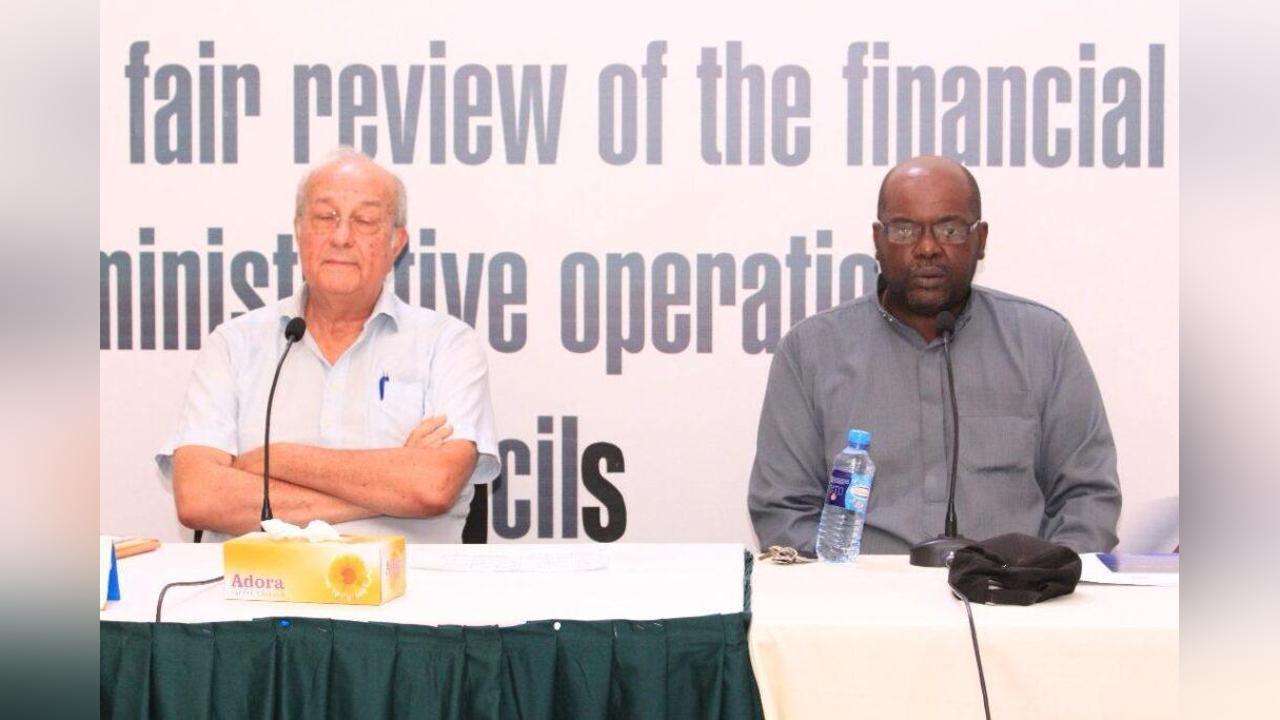Africa-Press – Gambia. The Local Government Commission of Inquiry on Wednesday, July 2, scrutinized a contentious land transaction involving the Banjul City Council (BCC) and businessman Chabell Elhajj, raising serious concerns over possible fraud and procedural breaches.
Evidence presented before the Commission revealed that Mr. Elhajj leased a parcel of land from BCC for D2 million and subsequently sold it to EMK Stores for approximately D15 million. According to Elhajj, it was Banjul Mayor Rohey Malick Lowe who initially asked him to buy the land.
Appearing alongside Mustapha Batchily, the former Chief Executive Officer of BCC, Elhajj faced pointed questioning from Lead Counsel Patrick Gomez. Batchily told the Commission he was unaware of the original lease agreement but acknowledged that he facilitated the transfer of the land to EMK Stores upon receiving a written request from Elhajj.
In his testimony, Elhajj claimed he was first approached by a Nigerian company seeking land in Banjul to establish a facility for assembling household appliances, including refrigerators and air conditioners. He said the arrangement was made verbally, prompting Counsel Gomez to question the plausibility of entering into a multi-million-Dalasi venture without formal documentation. Mr. Elhajj contended that verbal agreements are common in business. When questioned by Counsel Gomez about the length of his business career, the witness responded, “All my life, I was in trading.”
Counsel Gomez pressed further, suggesting that such experience should have made him aware that his actions were not typical business practice. “Would it be? You will not risk D2 million; it is a high risk. D2 million for a business you are not sure will succeed,” Counsel Gomez remarked.
Mr. Elhajj defended the verbal agreement, stating that many business dealings are conducted informally and that his extensive experience in trading justified the approach. He recounted that in 2019, he approached BCC to acquire the land without being asked to provide any formal documentation by the council.
According to Mr. Elhajj, the initial project with the Nigerian firm failed after the company deemed the land unsuitable. Subsequently, he engaged EMK Stores and formally requested BCC to transfer the lease to them. The land initially allocated behind the National Assembly was later reassigned to a plot on Bone Road.
“That project failed because the company did not find the place suitable. I subsequently managed to get EMK stores involved, and I wrote to BCC that they should transfer the land to EMK stores. The first land proposed by BCC was behind the national assembly and later relocated to another land on Bond Road,” he said.
He testified that a Nigerian company ultimately rejected the land after he had already leased it from the Banjul City Council (BCC) for D2 million dalasis.
However, under sustained questioning from counsel, the witness altered his account—initially stating he paid the D2 million to BCC before the Nigerian company considered investing, but later claiming the payment was made after reaching an agreement with EMK Stores.
When pressed on the inconsistency, the witness attributed the confusion to his age and the passage of time. Counsel challenged this explanation, asserting that the witness only revised his testimony after his original version was discredited. “This is why I said to you the agreement was all along with EMK stores. You don’t have a message, email, or any form of document to show that a Fictitious Company existed, especially in this transaction. You don’t do business like that,” Counsel Gomez said.
Elhajj contested the claim that the agreement was solely with EMK Stores, stating, “The people who are witnesses to this are still living here.”
Lead Counsel Gomez challenged this explanation, highlighting the absence of any tangible evidence, such as messages or emails, to support the existence of the Nigerian company or any dealings with it. Counsel Gomez asserted that the entire transaction was conducted with EMK Stores, accusing Mr. Elhajj, Mayor Lowe, and potentially Mr. Batchily of engaging in fraudulent activity to unlawfully profit from the transaction.
“I am accusing you, Mayor, and possibly Mr. Batchily, of fraud. The evidence showed that you profited unlawfully from a transaction that was dubious in the first place,” Counsel Gomez charged.
Mr. Elhajj denied any wrongdoing, maintaining that no documents were requested by BCC and that the deal was legitimate. Counsel Gomez countered that the lack of due diligence by the council indicated a lack of genuine interest and proper procedure. Stating: “If you are going to convince anyone of a multi-million Dalasi project, you will go with serious information so that they will act on that information and do due diligence.”
The counsel emphasized the importance of adhering to established criteria in land transactions, pointing out the suspicious nature of transferring land payments made by one party to another without appropriate documentation or approvals.
“When someone has an agreement with party A and party A pays D2 Million when you are to transfer the land to party A, he said No, you should transfer it to party C. That is a suspicious transaction by any standard,” Gomez said.
For More News And Analysis About Gambia Follow Africa-Press






